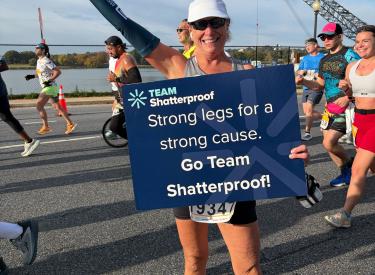
The Stigma of Addiction Summit: Winning Presentations
The stigma of addiction is not just unjust—it’s deadly. According to new CDC data, nearly 91,000 Americans died from an overdose in the 12 months ending in November 2020, which is a record high. To help more Americans with substance use disorders access lifesaving treatment, it’s more important than ever to root out the stigma that keeps so many of our loved ones suffering in silence.
On June 10, over 4,500 individuals from all across the country came together to attend the inaugural Stigma of Addiction Summit, hosted by Shatterproof in partnership with the National Academy of Medicine (NAM) and Dell Medical School at the University of Texas at Austin (DMS). This half-day, virtual, action-oriented summit was entirely dedicated to understanding, addressing, and eliminating the harmful impacts of stigma on people who use drugs.
Prior to the Summit, we invited the submission of video abstracts for consideration at our Innovation Awards. We received over 100 impressive submissions, and the winners were narrowed by a panel of reviewers.
Watch this playlist to see the inspiring presentations of our six winning submissions.
Here’s more detail on the winners and what their submissions outlined:
- The University of California San Francisco’s Health Network launched a pilot to distribute intranasal naloxone and safer consumption supplies in safety-net primary care clinics with the goal of preventing overdose deaths, increasing safety around substance use, and overcoming barriers to access of prevention and treatment services. They strived to include the voices of people with lived experiences in their trainings in the development of the curriculum and via narratives of their personal experiences with harm reduction, stigma, and overdose prevention.
- The Friends Research Institute and the University of Maryland School of Medicine modified an existing evidence-based treatment for adults with serious mental illnesses so it can be used to reduce internalized stigma and problematic anticipated stigma for justice-involved people being treated with or considering the use of medications for opioid use disorder.
- RIZE Massachusetts’ Together in Recovery: Supporting Informed Decisions initiative developed a “Your Rights in Recovery Toolkit” that explains varied treatment options, including clinical interventions, peer-based recovery support, and harm reduction for people with opioid use disorder. It also includes facts about an individual’s legal rights, self-advocacy tips and resources on the topics of families, housing, education, employment, and the justice system that are important to understand.
- Changing the Narrative, a network of reporters, researchers, academics, and advocates concerned about the way that media represents drug use, addiction, and chronic pain, helps journalists and opinion leaders provide accurate, humane, and scientifically grounded information. They offer expert sources – including people with lived experience of the issues – and up-to-date, fact-checked, and evidence-based information to a wide range of audiences in addition to the media, including nonprofits, organizers, activists, professors, researchers, and healthcare providers.
- The Arab Community Center for Economic and Social Services and Wayne State University, recognizing that not much is known about substance use among Arab Americans, is developing a reliable and valid measure of public stigma to substance use for the Arab American community to guide and monitor as an outcome for interventions. This stigma measure will then guide and monitor the impact of interventions in the community.
- Arizona State University (ASU), in partnership with Blue Cross Blue Shield of Arizona, HonorHealth, and Arizona’s Medicaid program developed the Medication-Assisted Treatment (MAT) ECHO program to address the continued shortage of providers integrating MAT practices into their clinics. The MAT ECHO program addresses these barriers by integrating education around stigma, sharing of best practices, normalizing the use of MAT in standard medical practices, and ongoing clinical and technical consultation to providers across the state.
The playlist of the winning submissions can be viewed here.
All accepted submissions are detailed here, and the 13 finalists who submitted video abstracts (including those listed above) can be viewed here.
Thank you to all who submitted abstracts and attended the summit! We’re looking forward to creating additional strong partnerships and continuing to learn from each other as we move forward together to end addiction stigma.
Rachael Cooper is an Associate Director for the National Stigma Initiative. Learn more about Shatterproof’s stigma work here.



